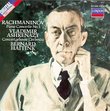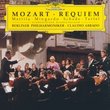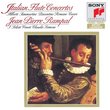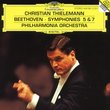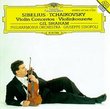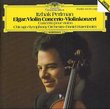| All Artists: Beethoven; Wagner;schumann; Brahms, Abendroth, MDR Orchestra; Breslau RO; Gewandhaus Orchestra, laux-Heidenreich; Fleischer; Wilhelm Kempff Title: Hermann Abendroth: Unreleased Broadcast Performances 1939-1950 Members Wishing: 0 Total Copies: 0 Label: Music & Arts Program Original Release Date: 1/1/2006 Release Date: 1/1/2006 Album Type: Box set Genre: Classical Styles: Forms & Genres, Concertos, Historical Periods, Classical (c.1770-1830), Modern, 20th, & 21st Century, Instruments, Keyboard, Symphonies Number of Discs: 4 SwapaCD Credits: 4 UPC: 017685106521 |
Search - Beethoven; Wagner;schumann; Brahms, Abendroth, MDR Orchestra; Breslau RO; Gewandhaus Orchestra :: Hermann Abendroth: Unreleased Broadcast Performances 1939-1950
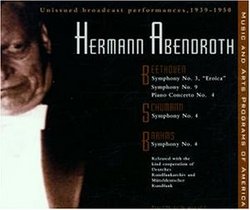 | Beethoven; Wagner;schumann; Brahms, Abendroth, MDR Orchestra; Breslau RO; Gewandhaus Orchestra Hermann Abendroth: Unreleased Broadcast Performances 1939-1950 Genre: Classical
|
Larger Image |
CD DetailsSimilarly Requested CDs |
CD Reviews"Old School" Conducting Jeffrey Lipscomb | Sacramento, CA United States | 06/28/2004 (5 out of 5 stars) "Hermann Abendroth (1883-1956) was, like Wilhelm Furtwangler, a pupil of Felix Mottl, who taught a highly "subjective" style of conducting, with flexible tempos and highly expressive phrasing. In contrast to Furtwangler's rather mystical spirituality, Abendroth's music making tends to be earthier - rather like a more animated version of Hans Knappertsbusch. Like Mengelberg, Abendroth was not hesitant to change tempo and alter dynamics where he deemed it necessary (Mengelberg carried those practices to greater extremes). These conductors are all what you would call "of the Old School" - and, by and large, their recordings make most of today's efforts sound rather tepid and unimaginative by comparison. This superb 4-disc set from Music & Arts is probably the best single introduction to Abendroth's artistry. These are all broadcast performances 1939-1950 and, given their age, the sound is remarkably clear. The 1949 "Eroica" is a scorching, highly dramatic account. It is now one of my favorite readings, along with those by Furtwangler, Mengelberg, Weingartner, Kleiber, Schuricht, and Scherchen. This 1950 9th is likewise a real stunner - the best of the three Abendroth versions that I have heard (the 1939 finale also included here is less interesting). It belongs to a very select group of 9ths: a trio of Furtwanglers (1942, 1951 and 1954 - all "live"), the Weingartner, Busch, and Konwitschny. This Brahms 4th is similar to his earlier studio acount (on a Biddulph CD), but it benefits from somewhat better sound and the excitement of a live performance. It is also quite similar in spirit to Furtwangler's, especially the tempo fluctuations in the last mvt. This is "romantic" Brahms at its best. I also treasure the somewhat more "classical" readings by Weingartner and Schuricht. My favorite Schumann 4th is the studio Furtwangler - but this Abendroth performance has a firm hold on second place. Kempff is more dramatic with Abendroth in the Beethoven 4th Piano Concerto than he was in his later studio reading with Kempen (both are far preferable to Kempff's stereo account with Leitner). Kempff's own peculiar cadenzas are always something of a jolt - all in all, I still prefer the old Schnabel/Sargent to any other. And lastly, the Wagner Faust Overture is quite simply the best interpretation I have heard - it has completely displaced Horenstein's in my affections. If you are seeking orchestral performances of great imagination, extraordinary virtuosity, and genuine depth of feeling, you have come to the right place. This set is essential!" Mostly superb, except the last cd Jeffrey Lee | Asheville area, NC USA | 07/27/2004 (5 out of 5 stars) "I wouldn't miss the fourth cd if someone decided to remove it from this set. It contains the final movement only of a Beethoven Ninth Symphony performed with the Leipzig Gewandhaus Orchestra, taken from a radio broadcast in late 1939, eleven years prior to a different and complete Ninth (cd 2 in this set) given by the Leipzig Symphony Orchestra. It also includes a Beethoven Fourth Piano Concerto with Wilhelm Kempff. In that single (presto) movement of the Ninth, Abendroth's uneven direction makes for a rather bizarre show. At times, the soloists sound as if they are being dragged, pushed and disoriented. Additionally, the sound is not too good, though it is not as bad as that on the Fourth Concerto. Here, aside from relatively cramped acoustics, one confronts crackling and swishing noises. Some might be able to overlook all of that and express praise for what they might consider to be Kempff's poetic performance. I will do neither.
Now, let's get to the good parts. The complete Beethoven Ninth has some impressive moments, including a beautifully shaped third movement. However, despite Abendroth's basically fine job, I don't get that special feeling that something momentous is in the offing, as I do with the performances of Klemperer (live on Testament) and especially Reiner with the Chicago Symphony ( See my reviews of these two performances. )....The best of the set includes the Schumann and Brahms Fourths (both recorded in 1950 with the Symphony Orchestra of the Middle German Radio), the Beethoven Third (also 1950, but with the Leipzig Symphony) and the Wagner Faust Overture (Berlin Phil., 1944). Incidentally, as with the complete Beethoven Ninth the sound given these four works is fine, (unlike that on the aforementioned fourth disc). In the Schumann Fourth there are episodes where Abendroth's bold assertiveness and lightening fast movements prove exhilarating. Though there is a little meandering in one portion of the last movement, on balance this is a very fine, involving interpretation....In the Beethoven Third Abendroth is most effective at providing the kinds of powerful accents that enhance the satisfaction of his striking reading. While he doesn't quite attain the level of tragic depth in the funeral march expressed by Bohm/Vienna Philharmonic (though he is still very convincing), he eclipses him in drive in the scherzo. Both conductors display superb detail in the first and last movements, with Abendroth's close being particularly riveting....The Faust Overture by Wagner is given an appropritely dark, melodious and intensely dramatic performance....Finally, the Brahms Fourth receives one of the most wonderfully characterized accounts of this work I've had the pleasure of hearing. It is imbued with the kind of feeling that demonstrates a sympathetic awareness of the piece's marvelous musical qualities. The second movement andante is particularly moving. And the series of dynamic variations that comprises the final movement reveals more humanity than is customary. In all, a lovely, extremely satisfying Brahms 4. Despite the first mentioned fourth disc, I give this set the highest rating." |

 Track Listings (5) - Disc #1
Track Listings (5) - Disc #1